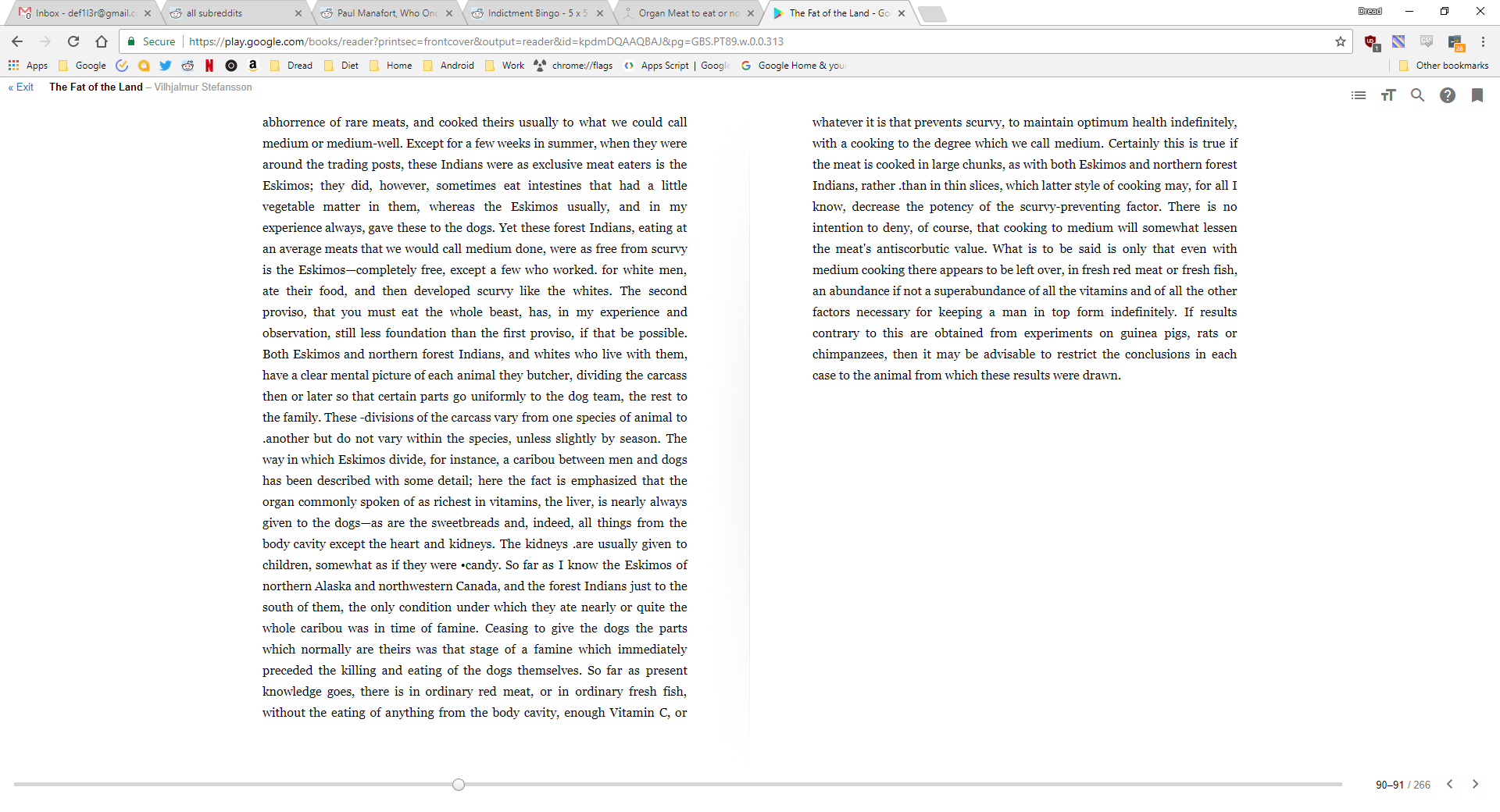Do I have to eat organ meat to get enough minerals, or is muscle meat fine, and is there any research that discusses why?
Organ Meat to eat or not to eat?
I don’t think there’s any research, but muscle meat is fine. Some people on the diet take a multivitamin just in case they are missing anything. Biggest thing on the diet though is getting enough electrolytes; Sodium, Potassium, Calcium and Magnesium
Sodium and potassium: A good source is Morton’s Lite Salt. Just add to food or drink.
Calcium: This should take care of itself with the additional dairy you are partaking in.
Magnesium: 400mg of magnesium a day has done wonders for me personally. If the pills relax your colon too much, epsom salt soaks are perfect.
If you do want to eat organ meat, Beef Liver is the most nutrient-dense food in the world.
Well, liver is a top source for folate, and folate is pivotal for a bunch of other processes including totally natural anti-depressant help (as well as cancer prevention and optimal fertility) - and organ meats are a concentrated source of CoQ10, which is a critical factor for cellular health.
One can purchase expensive supplements or one can master the secret techniques of cooking exquisite organ meats - we fortunately have those options. I like the patheanthropological argument that collagen/bone broth plus organ meats are both part of biodynamic dietary support. For organ meats, capsules are a wonderful help for those of us who’d prefer to avoid having to learn the gourmet tricks of cooking it so its tastes great…
I already use collagen peptides added to undenatured whey in my smoothies at least once a week, and just started taking grassfed, humanely raised liver capsules (2 a day, when I have a smoothie) and noticed distinct energy, like some others have reported.
My next plan is to experiment with cooking grassed/organic liver in the French way that makes it not taste like liver! Apparently marinating it the night before in either red wine vinegar, plain red wine, or milk (not both, just one or the other) does wonders and makes it a delicacy. Not sure how much of the milk carbs would be absorbed by the liver, and red wine or red wine vinegar is prob the lowest carb option. As liver is a major filter of the mammal, I think it’s critical to avoid the industrial factory farm/feedlot beef & chicken liver, as one serving of it may contain many toxins including adrenaline due to inhumane slaughtering practices, which is not helpful for one’s cortisol levels.
Because I have a negative taste memory of liver due to badly cooked liver in childhood, I have postponed eating liver a long time - but when done right, with some butter sauteed slivered onions and garlic, it has been a much loved dish in French cuisine. I imagine with research one can find all sorts of handy liver recipes… I’m just not quite there yet 
I remember eating liver once, and all I remember of it was ick lol, so honestly the idea of eating organ meat is not appealing to me.
Pick up any of Julia Child’s books. Liver can be delicious, when combined with lots of wine, cream, and butter.
Try Braunschweiger, I think it tastes great with a little piece of cheese and a little avocado oil Mayo and a bit of spicy mustard, Jones brand Braunschweiger is my favorite, I’ve always liked it just now without bread,
@richard mentions he is not a fan of organ meats. He says he eats more veggies to get the nutrition. I think he has mentioned this in several broadcasts. Pretty sure one was the Marty Kendall episode. I personally grew up eating hearts, livers, gizzards, beef tongue, even had brains once (only one I disliked, the texture was too weird for me). I’ve had haggis in Scotland too. So I am a fan of organs etc. And chicken feet are terrific things, make the best chicken broths ever.
She was crazy for butter and cream, I am always finding new things to try in her cookbooks. Her baked cucumbers are awesome.
She could get very keto with her cooking.
My 2 cents: traditional cultures favor animal fats and organ meats for good reasons (some of which we are slowly figuring out and some which we have yet to understand). Limiting ourselves to muscle meats is a fairly new phenomenon and so far our experiments with modern ideas of what’s best to eat… well, let’s say they don’t have a great track record.
I think that keto/LC is so dramatically better than SAD or the standard LFHC that I wouldn’t expect health problems from omitting organ meats, but I bet there’s something to be gained from integrating organ meats into our eating.
I agree, but after a great deal of consideration I’m going to forgo organ meats. Even if I buy organic or grass fed, I just don’t have the confidence in the safety of organ meat here in the US, and since I’m doing this for health reasons it’s not worth the risk for me.
It’s not a fairly new phenomenon if you count the research done by Stefansson with the Inuit 100 years ago.
@Dread1840 Yes, we discussed this on another thread. At the time you said you were still finishing the book so weren’t sure exactly what parts of the animal they were eating. What I’ve seen, blood and seal liver are at the top of the list, intestines and (fermented) heart, etc. I think it would take some getting used to…
When Stefansson returned home he probably wasn’t eating those things (but at that point even in the US, organ meats were much more common menu items).
[ETA: just finished a quick reading of Inuit diet practices from a few things I found online. Nothing super indepth, but very interesting! More tubers and berries than I would have thought. Also so much of their meat was eaten raw, which actually changes the macronutrient profile (what?!). Dread, are you looking at sources other than Stefansson? It doesn’t seem like he had the best reputation for veracity.]
By that logic you should not eat any meat from the U.S.
Organ meats are great if you can get them. Liver is a delicious food if you don’t overcook it. Bread it with coconut flour and pan fry it for about 90 seconds on each side, depending on the thickness, and you’re done. And don’t forget steak and kidney pie—I’ll bet there’s a way to serve it that’s keto!
A lot of the foods people my age hated as children were greatly overcooked. I suspect it was a defense against diseases such as typhoid, for which vaccines didn’t exist back then. Broccoli cooked for forty minutes is inedible in my book, but the concept of al dente did not exist in my grandmother’s lexicon. Likewise with liver cooked ten or fifteen minutes on each side—it tasted and felt like sandpaper!
In addition to organ meats marrow is a great source of nutrients. I know the thought of pigs’ feet probably makes most of you youngsters squeamish, but I bet you’d eat a dish of osso bucco at a fancy Italian place. Unfortunately, oxtail became trendy a couple of decades ago and the price shot up, but it used to be dead cheap, and it makes a delicious and nutritious soup or stew.
Don’t forget all the lovely preserved foods that come from organs: head cheese, blood sausage—any sausage, really—most of them are unobtainable these days because we’ve gotten all squeamish, but the disgust factor is all in our heads, the foods are delicious.
Dr. Phinney says that Stefansson used to joke that it was a good thing the other folks in his New England village were afraid of fat and organ meat, because the local butcher would save it all for him and give it to him practically for free! At one point during the famous experiment at Bellevue Hospital in 1927, Stefansson and Andersen were convinced to eat exclusively muscle meat. They quickly began to feel ill, but a little organ meat made them better almost at once.
You’re right, and I apologize for forgetting this exchange. It’s funny because I read the following shortly after we spoke.

Interesting. It sounds like there are a lot of folks that disagree with his telling of things - in particular around the raw/cooked question - but even in this bit that you posted, they’re not just eating muscle meat.
Also - and I think this is important - sea mammals and fish have a different nutritional profile than land mammals. I don’t know the details but my guess is that it does matter (i.e. if you’re going to use Inuit eating as a model, then your diet should probably include whale blubber, seal kidneys, etc - also I guess Inuit genes would come in handy  ).
).
I don’t disagree with you overall about ZC and I’m really curious about that way of eating - and for the people who thrive on it, it’s exponentially better than most of what’s out there - but muscle meat of cows =/= anybody’s ancestral diet.
This is probably what meat eating looks like for many traditional humans (though I’m sure there was plenty of cooking/curing/fermenting involved at later stages…)
(These are Nenet, not Inuit, children, feasting at the open belly of a freshly-killed deer.)
They were fed lean muscle meat. They were explaining how a lack of fat made them sick, not the lack of organ meat.
Organ meats provide vitamins and minerals, and often are very fatty. It’s a matter of finding a way to prepare them that you enjoy.
I feed my dogs a natural diet of meat and fat, with an additional 10% of organs added at the end. Doggie-Paleo. One benefit, besides them being healthy and long lived, is that I never have to scoop my yard. Their poop quickly turns white and dissolves.

